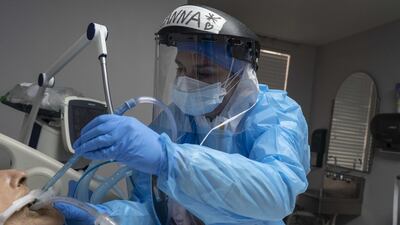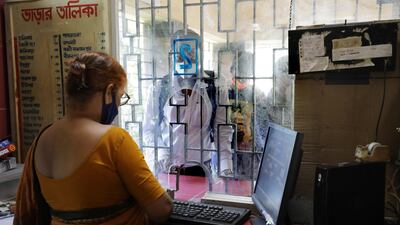Covid-19 survivors face a significant risk of developing a mental illness – and those who already suffer from one are more likely to catch the virus, according to new research.
The findings come from a large study of patients in the US that discovered about 20 per cent of those infected with the coronavirus had a new psychiatric disorder diagnosed within 90 days.
Anxiety, depression and insomnia were the most common conditions diagnosed for the first time, but the researchers also found significantly higher risks for dementia.
The study found that people who suffered from a pre-existing mental health condition were 65 per cent more likely to have Covid-19 diagnosed than those without.

The researchers speculated that could be a result of their physical health, or the drugs they were prescribed.
“People have been worried that Covid-19 survivors will be at greater risk of mental health problems, and our findings ... show this to be likely,” said Paul Harrison, a professor of psychiatry at the University of Oxford, which carried out the study.
The researchers assessed the health records of almost 70 million people living in the US, which included more than 62,000 cases of Covid-19, for the study, which was published in The Lancet Psychiatry journal.
The findings are likely to be the same for those afflicted by Covid-19 worldwide, they said.
“In the period between 14 and 90 days after Covid-19 diagnosis, 5.8 per cent of Covid-19 survivors had their first recorded diagnosis of psychiatric illness, compared with 2.5 per cent to 3.4 per cent of patients in the comparison cohorts.
“Thus, adults have an approximately doubled risk of being newly diagnosed with a psychiatric disorder after Covid-19 diagnosis.”
Experts say patients with Covid-19 experience an array of effects on the brain, ranging from loss of smell to strokes, and the virus has been proven to affect the central nervous system.
The association between psychiatric problems and Covid-19 is already well established in research, with health care workers facing the biggest risk.
But health clinics have noted an increase in patients seeking help across the board, with some seeing patients aged 70 experiencing anxiety disorders for the first time in their lives.
Many have not suffered from the virus, but have been negatively affected by the social isolation associated with lockdowns, they said.
But they are also treating Covid-19 patients for newly-diagnosed mental health disorders.
“We have seen that in our practice,” said Dr Vassiliki Simoglou a licensed psychologist at Thrive Wellbeing Centre.
Anxiety disorders among Covid-19 sufferers may be partly explained by the stigma surrounding the virus, she said.
“There is a stigma of contracting Covid-19, a feeling of shame for having had it, or caught it, or not wanting to tell people because they want to experience it privately.
“It could also be health anxiety and worrying about having Covid-19 diagnosed, worrying about what the implications of this are for my health.”
She said the increased risk of contracting the virus for people with pre-existing mental health conditions was interesting.
It could partly be explained by the fact that some disorders are associated with a lower tolerance for risk, meaning they would be less likely to follow advice, such as sanitising their hands.
“There are some personality types who would engage with more risky behaviours,” she said, pointing to borderline personality disorder as one.















